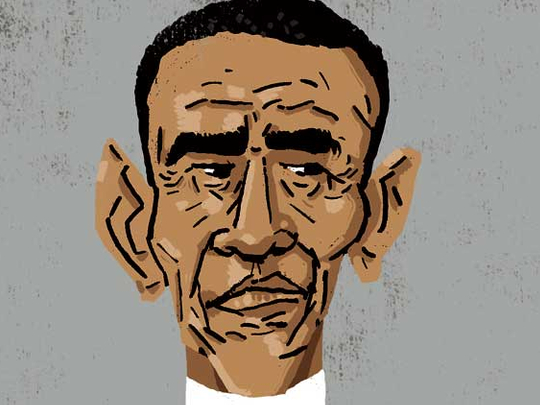
Remember September? That was when Barack Obama’s mishandling of Syria destroyed his presidency. An ill-considered plan to seek congressional approval for military action against Bashar Al Assad backfired when support for the president’s proposal evaporated. He was saved only when the Russians chose to take an off-hand gaffe by Secretary of State John Kerry seriously.
Of course, you may have forgotten how Syria destroyed the Obama administration because that all happened a month before the US president won a stunning victory over Congressional Republicans. The GOP had shut down the federal government as part of a Don Quixote-like plan to kill Obama’s health care law. In besting them, Obama proved himself a master of political strategy and assured himself of three more successful years in the White House.
Don’t remember that? Perhaps that is because Obama’s presidency effectively ended in November when his health care reforms imploded. Some people could not log in to the plan’s website. Others were angry about having to drop existing health plans for something new despite Obama having promised this would not happen. That broken promise caused the entire country to lose faith in him to the extent that he is now little more than a placeholder, marking time until someone else is elected in 2016.
Unless, of course, something else happens. America’s pundit class is famous for its short attention span and lack of historical perspective (or even perspective going back a month or two), but even by their standards, the last few months have been something to behold.
Every leader has his ups and downs, but American presidents who win reelection have a long history of hitting their political low points in the first year or two of their second terms.
Following a landslide victory in 1936, Franklin Roosevelt stumbled badly when he attempted to reorganise the US Supreme Court by adding extra justices, more in tune with him, politically. Richard Nixon’s second term was consumed, and eventually cut short, by the Watergate scandals. A second term Ronald Reagan stumbled through the Iran-Contra affair. The re-elected Bill Clinton spent his second term mired in the Monica Lewinsky scandal and fighting impeachment. George W. Bush’s disastrous adventure in Iraq began during his first term, but reached its nadir in his second (he also began term number two with a politically damaging attempt to reform Social Security — America’s old-age pension system).
So, at one level, it should hardly be surprising that year five of the Obama presidency has been a bit of a mess. Political scientists can debate why this sort of thing seems to happen so often in the US, but the fact is that it does.
The deeper question is whether the damage is terminal.
The simple answer to this question is: Of course not. Three years is a long time and it is worth noting that, despite the wild swings of pundit opinion documented at the beginning of this column, over the last few months, Obama’s approval ratings have remained relatively stable (a sign, perhaps, that ordinary Americans are more level-headed when it comes to politicians than people who follow this stuff for a living).
If Obama can allegedly go from disaster to triumph and back to disaster in three months surely the real lesson is that things are usually neither as awesome nor as dire as they seem.
This is true, but only up to a point. The real question is whether modern Washington’s permanent campaign season, the media’s short attention span and an opposition that often seems to prefer scorched-earth tactics to compromise will leave the Obama administration (and, perhaps, any future administration) time to think of governing in terms of anything beyond day-to-day damage control.
American presidents wield immense power, even when their political fortunes are at a low ebb. George Bush Sr sent troops to Somalia after losing his reelection bid to Bill Clinton. George W. Bush signed a far-reaching agreement with Iraq as the clock was running out on his time in office. Jimmy Carter was actively involved in negotiations to free the American diplomats held hostage in Iran until, literally, the final moments of his presidency.
So whatever problems Obama may encounter over the coming months concerning health care, Iran, immigration reform or Syria, it is worth remembering that underestimating the US president is rarely a good idea. Indeed, if, as seems likely, domestic affairs and an intractable Congress make Obama’s life difficult in the coming years, he is likely — like so many second-term presidents before him — to turn increasingly to foreign policy as an area where he can act with greater freedom. That prospect promises both opportunities and frustrations for America’s adversaries and allies alike — especially in the Middle East.
Gordon Robison, a longtime Middle East journalist and US political analyst, teaches political science at the University of Vermont.










